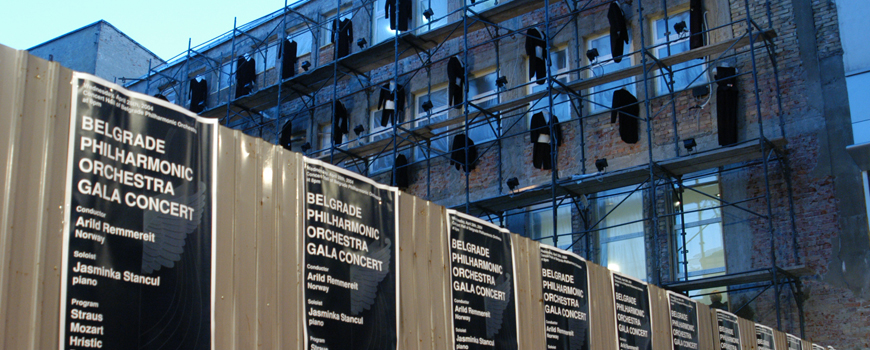
First Steps
The Belgrade Philharmonic Foundations was established in June 2004 by decision of the Belgrade Philharmonic Orchestra Management Board. By decision of the Ministry of Culture, the Foundation was registered in the Registry Foundations and Charitable Trusts on 6 July 2004, and re-registered with the Serbian Business Registers Agency on 1 March 2012, pursuant to the Law on Charitable Trusts and Foundations.
It was established with the primary goal of improving the financial position of the Belgrade Philharmonic Orchestra through a system of sponsors and friends. Thus, after a fundraising concert in April 2004, in season 2004/2005 the Belgrade Philharmonic Foundation’s VIP Club was opened. The main idea of this project was to gather the most renowned institutions, companies and individuals, who, in addition to charitable work for the benefit of the Belgrade Philharmonic Orchestra, would also engage in mutual cooperation and form a stakeholder group of a kind.
However, as the institution developed, its goals became increasingly ambitious.
Zubin Mehta’s Support
At the initiative of one of the leading authorities in the world of classical music, Zubin Mehta, in season 2005/2006, a designated fund for instrument procurement and maintenance bearing his name was established within the Belgrade Philharmonic Foundation (Zubin Mehta Fund). Within the Homage to Hans Swarowsky subscription programme, Maestro Mehta gave two concerts, on 26 and 27 November 2005, and donated his fee for these concerts as the initial investment in the Fund. This was invaluable in replenishing the instrument stock, which has now been almost fully renewed.
Zubin Mehta visited the Belgrade Philharmonic Orchestra again in February 2010. In addition to the fee for two concerts, Maestro Mehta gave up the royalties for his autobiography The Score of My Life, published by the Belgrade Philharmonic Orchestra as part of its publishing activities.
After the concert, from the stage, Mehta openly invited the leading political and business figures in Serbia to support the success of the national orchestra by investing in a new Belgrade Philharmonic concert hall. Since that point, the Foundation has developed in a new direction, towards a clear goal – to build a concert hall that will become a new Belgrade landmark by 2020.
During that visit, Mehta was named the honorary president of the Foundation, which has proudly borne his name since – Zubin Mehta Belgrade Philharmonic Foundation.
Public-Private Partnership
In 2010, the Belgrade Philharmonic Foundation’s operation entered a new stage. It became the initiator and driver of the public and private sectors’ cooperation in funding culture in Serbia, which became the main focus of its further activities and development. To that end, the Foundation organised the First Conference on Cooperation between Private and Public Sectors in Funding Culture in March 2010. In three days, the conference gathered the business sector, media and political elite around this principle, which is of vital importance to the survival of not only culture, but also the entire not-for-profit sector in Serbia.
Social Responsibility
In 2011, the Foundation was awarded funding from the EU Civil Society Facility for its New Year’s project for the purpose of promoting multiculturalism and tolerance. In addition to organising concerts in the New Year Cycle, the funds were used to film and air documentaries on marking the new years of different religious and ethnic communities, in collaboration with the Serbian Broadcasting Corporation
In the same year, the Foundation initiated another long-term project that received the broadest public support – the regional cooperation project of the Slovenian, Zagreb and Belgrade philharmonic orchestras titled Pika – Točka – Тачка (“dot” in their respective languages).
Goals Achieved and Plans for the Future
Today, the Zubin Mehta Belgrade Philharmonic Foundation gathers proponents of corporate philanthropy around the values it advocates and, with the funds thus raised, supports the following projects:
- procuring instruments for the BPO;
- enhancing the artistic quality of the orchestra and the standing of the institution of Belgrade Philharmonic Orchestra in society;
- engaging world-renowned names in classical music on the domestic music scene;
- BPO international tours and guest appearances;
- production of audio and video recordings and publishing work;
- improving the musicians’ working conditions;
- advancing the status, educational levels, living standard and protecting the dignity of BPO musicians;
- advancing the status of retired and disadvantaged BPO members;
- BPO marketing;
- initiating and supporting cultural decentralisation projects in Serbia;
- education of young talents and professional development of recognised musicians;
- Involving marginalised social groups, as well as those with special needs, in the Philharmonic’s regular activities; supporting inclusion projects.
- the Foundation has contributed to engaging an internationally renowned chief conductor;
- 22 new high-quality instruments and 13 hand-made bows have been procured;
- dozens of musicians have been sent abroad to pursue further studies;
- a cooperation project with regional philharmonic orchestras has been realised;
- Internet promotion of the BPO has been enhanced and new technologies implemented;
- scholarships have been awarded to young talented musicians;
- one-off pecuniary assistance was provided on several occasions to disadvantaged Philharmonic staff;
- dozens of social responsibility projects have been realised, in the areas of learning, promoting tolerance and diversity, assistance to musicians and support to the vulnerable.
With the funds raised by the Belgrade Philharmonic Foundation, the following objectives have been realised to date:
Future aspirations of the Zubin Mehta Belgrade Philharmonic Foundation concern the international promotion of the orchestra, development of the public-private partnership principle in funding culture and building a new concert hall.




